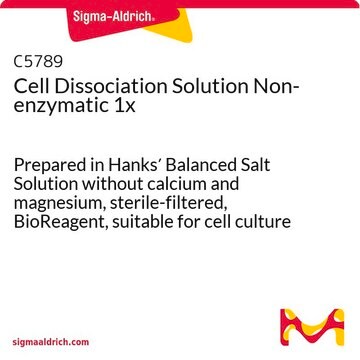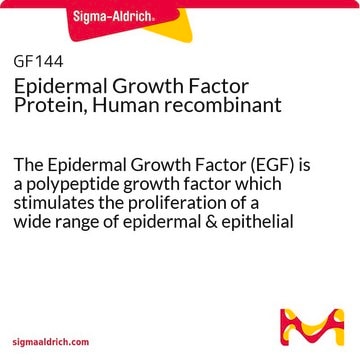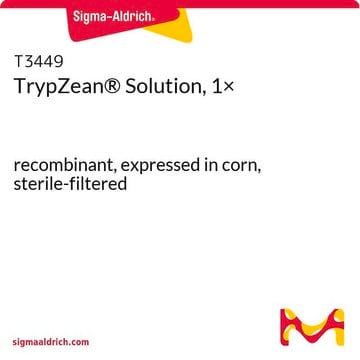C5914
Cell Dissociation Solution Non-enzymatic 1x
Prepared in phosphate buffered saline without calcium and magnesium, sterile-filtered, BioReagent, suitable for cell culture
Synonym(s):
Dissociation Solution
Sign Into View Organizational & Contract Pricing
All Photos(1)
About This Item
Recommended Products
Quality Level
sterility
sterile-filtered
product line
BioReagent
form
liquid
concentration
1 ×
technique(s)
cell culture | mammalian: suitable
pH
6.9-7.1
shipped in
wet ice
storage temp.
2-8°C
Looking for similar products? Visit Product Comparison Guide
General description
Cell dissociation by non-enzymatic methods in human mesenchymal stromal cells aid in their detachment and preserves their functionality especially the expression of cell surface chemokine receptor.
Application
Cell Dissociation Solution Non-enzymatic 1x has been used for the dissociation of retinal astrocytes culture, U87 glioblastoma tumor cells and cardiac stem cells (CSCs).
Special non-enzymatic formulation for gently dislodging adherent cell types from plastic or glass surfaces.
related product
Product No.
Description
Pricing
Storage Class Code
10 - Combustible liquids
WGK
WGK 3
Flash Point(F)
Not applicable
Flash Point(C)
Not applicable
Certificates of Analysis (COA)
Search for Certificates of Analysis (COA) by entering the products Lot/Batch Number. Lot and Batch Numbers can be found on a product’s label following the words ‘Lot’ or ‘Batch’.
Already Own This Product?
Find documentation for the products that you have recently purchased in the Document Library.
Customers Also Viewed
Non-enzymatic dissociation of human mesenchymal stromal cells improves chemokine-dependent migration and maintains immunosuppressive function
Garg A, et al.
Cytotherapy, 16(4), 545-559 (2014)
Human cardiac stem cells with reduced notch signaling show enhanced therapeutic potential in a rat acute infarction model
Matsuda T, et al.
Circulation Journal, 78(1), 222-231 (2014)
Isolation and characterization of murine retinal astrocytes
Scheef E, et al.
Molecular Vision, 11(4), 613-624 (2005)
Ineke D C Jansen et al.
International journal of molecular sciences, 21(17) (2020-08-29)
Lysosome associated membrane proteins (LAMPs) are involved in several processes, among which is fusion of lysosomes with phagosomes. For the formation of multinucleated osteoclasts, the interaction between receptor activator of nuclear kappa β (RANK) and its ligand RANKL is essential.
Nyla Naim et al.
Methods in molecular biology (Clifton, N.J.), 2173, 201-216 (2020-07-12)
cAMP is a crucial mediator of multiple cell signaling pathways. This cyclic nucleotide requires strict spatiotemporal control for effective function. Light-activated proteins have become a powerful tool to study signaling kinetics due to having quick on/off rates and minimal off-target
Our team of scientists has experience in all areas of research including Life Science, Material Science, Chemical Synthesis, Chromatography, Analytical and many others.
Contact Technical Service













